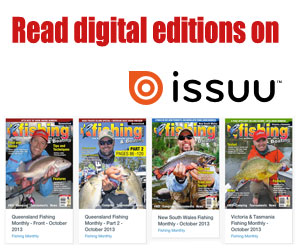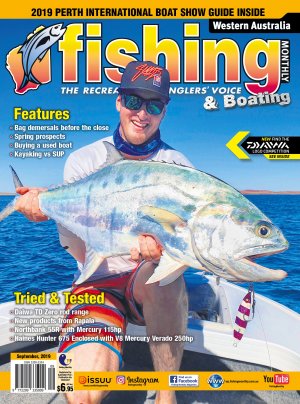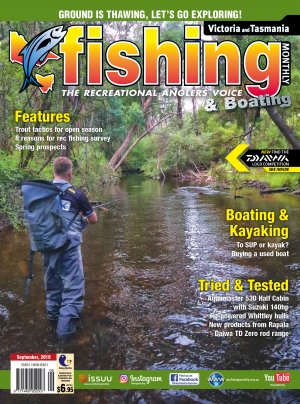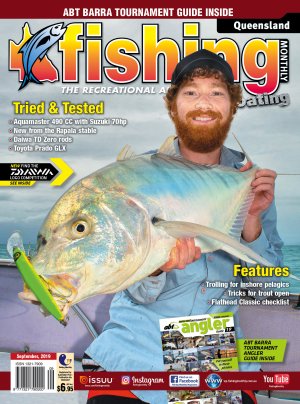Winter has wrapped its icy tendrils around the Canberra-Monaro countryside after one of the wettest Summers and warmest Autumns on record.
Let’s hope for a cold but wet Winter with plenty of snow. That should mean continuing good flow in the streams, high lake levels and a continuation of the good high country trout and lowland native fishing we have experienced during the past 12 months. How quickly our memories of the big drought disappear!
Anglers commonly split into two groups at this time of year.
One lot are content to put their gear away, hang up their waders and sit in front of a warm fire and gaze out at the snow and turn on the electric blanket.
They argue that they have had their fun for the season, caught their bags during the best of conditions and are now temporarily fished out.
Let the others fish, while they relax until Spring, do a few wader repairs, re-hook some lures, tie a few flies, sort out the photographic memories and plan for the next big fish.
The other group is still gung-ho to chase fish. They want their weekly fix on a stream or lake and will do anything to get it. Minus 10°? Frozen streams? Frozen water bottles, food and even frozen beer? Forget about it, we are going fishing no matter the weather.
So what can this brigade look forward to?
The trout streams won't reopen until the Labour Day weekend in October but the big lakes are open year-round and can provide some great fishing.
The lowland lakes, home to Murray cod, golden perch, silver perch and catfish, are open and provide some interesting challenges but nice rewards.
Then there are carp and redfin, which are almost everywhere these days, to provide diversions or perversions, depending on your outlook.
Trout are quite at home in Winter in the Snowy Mountains. Anglers aren't natural cold weather animals but they can dress properly for Winter fishing. Properly means safe, sensible and comfortable.
My routine Winter clobber consists of neoprene waders, thick socks, thermal underwear, beanie, neck warmer, gloves, thick shirt, jumper and a waterproof, breathable jacket.
This outfit is lightweight, functional and long-lasting because when I bought it I went for the best and it has paid off handsomely. I can fish in temperatures down to –15° and with a decent sleeping bag and tent can survive the toughest nights Jindabyne, Eucumbene or Tantangara can throw at us.
You learn some valuable lessons while Winter fishing. Take outboards, for example. Leave them up on tilt on a really cold night and they will freeze and break apart. Leave the leg in the water and no damage will ensue.
Similarly, if your reel gets water in it while fishing it will freeze and be inoperable. Keep it dry and you will have no trouble. If it does freeze, warm it with your hands or over the fire.
With fly rods, runners may freeze intermittently because of the wet line passing through. To unfreeze them, runners don't suck on them or you will get a fat lip. Maybe two fat lips.
Just dip the rod in the water from time to time and the ice will disappear.
Always take an esky with you. That's where you put your food and drink to stop it from freezing. Didn't you know an esky works both ways?
With a motor vehicle chains are essential if you don't have a 4WD. Even so, watch where you drive.
Quite often you can drive into a spot in the morning on perfectly hard ground because it is frozen. Later in the day, if the ground has thawed, you could find yourself driving through mud and slush that could land you in trouble.
You can fish for trout with bait, lure or fly right through Winter.
Bardi grubs, scrub worms and PowerBait are top baits and you fish them just as you would at any other time of the year.
Fly fishers often vary their technique by using larger flies, mostly wets, fishing deeper with sink-tip or sinking lines and using slow retrieves to cater for more sluggish fish.
Lure fishers fare better by fishing deeper and slower, using trolling sinkers, paravanes or lead-core line to get down to where the fish are.
Native fish are basically warm-water animals that are mostly sluggish during Winter but they can be attracted to lures or bait with the right techniques.
The best time to fish is in the afternoon, when the sunlight is strongest and the water warmest, and you have to go deep to where the fish are sitting in their preferred thermocline.
They are not especially easy to attract but you can improve your chances by using smelly baits such as scrub worms or bardi grubs, perhaps laced with aniseed oil. You can also try live, kicking yabbies which some tackle shops now sell year round.
If you are lure fishing use bigger, flashier, noisier lures than normal and work on the basis of pestering the fish to take the lure by repeated casting to the same location. It works well on cod and to a lesser extent on golden perch.
You need to go deep also, to get where the fish are, and retrieve or troll the lure slowly to give the fish every chance of taking it.
If trout and native fish are not your bag you can always fall back on redfin. Although they are pest fish they are here and we might as well make best use of them.
They are superb to eat and often can be caught in large numbers. Often, too, the larger ones show in Winter and sometimes you can encounter massive schools of the same-sized fish and take as many as you want.
They respond well to ice jigs, Baltic Bobbers, other small jigs and numerous noisy, flashy, spinning-blade lures and minnow patterns. Jigging in water 25’ to 30’ down is a preferred technique but trolling lures that get to that depth also is worth a try.
Then there is the fabled Lake Burley Griffin Mud Marlin, Cyprinus carpio. Despised, reviled and about as useful as tits on a bull, carp are still a fallback when all other fishing is quiet.
They are active all through Winter and readily take a worm, grub, sweet corn kernel or just about anything else you care to throw at them. Useless to eat, they can be fun to catch and are especially exciting on fly.
They are good fun for kids to catch because to them a fish is a fish and they don't necessarily care what species it is.
So there are your choices. Sit back in front of the fire after a long season or step outdoors and enjoy the rigours of Winter.
Reads: 2305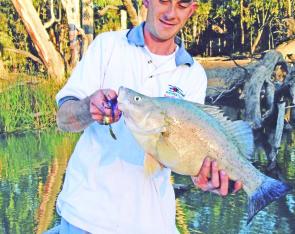
Golden perch are sluggish in Winter but sometimes still respond to bait or lures.
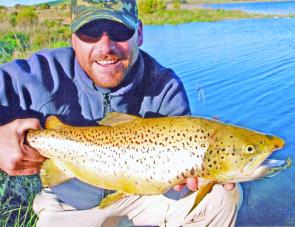
You need to go deep in Winter to find big browns like this handsome buck.
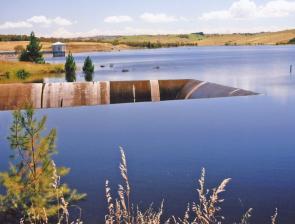
A cold wet winter will mean full reservoirs, like Pejar near Goulburn, and continued good fishing.

